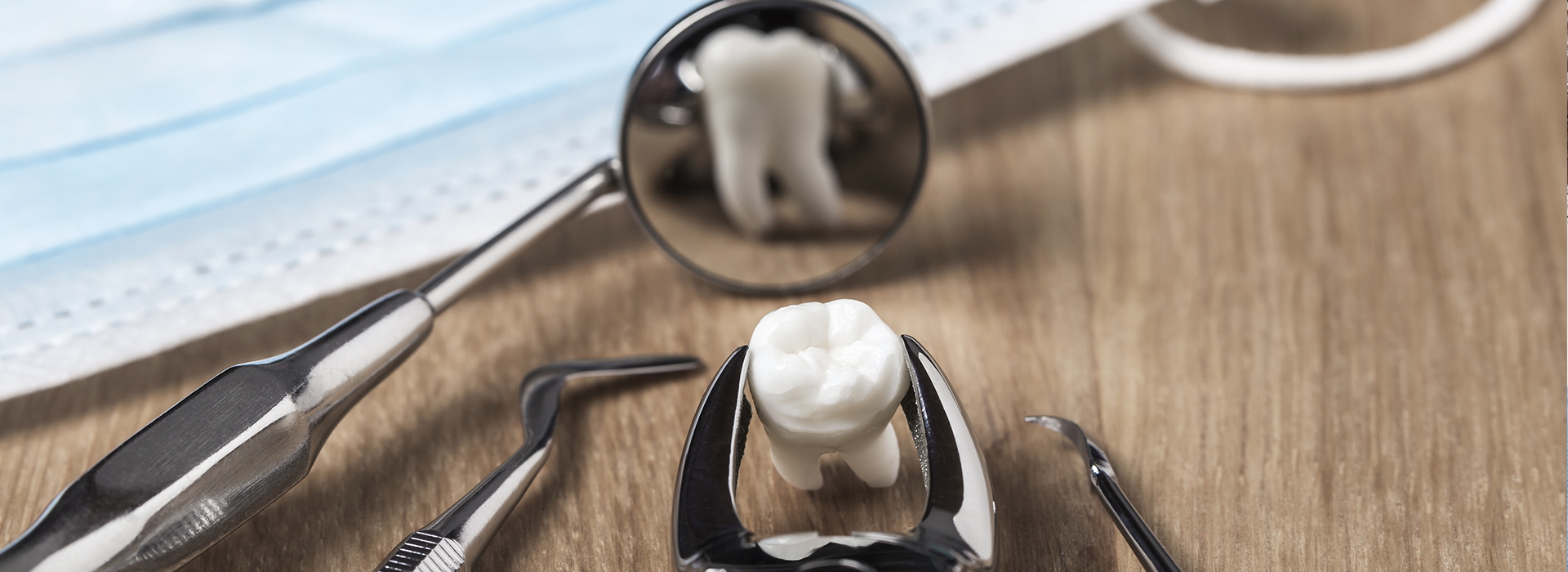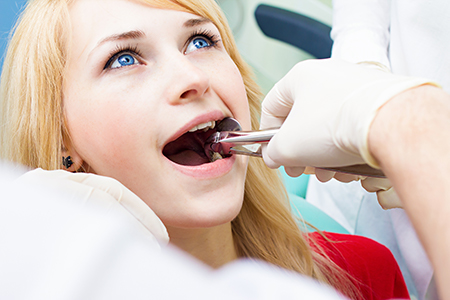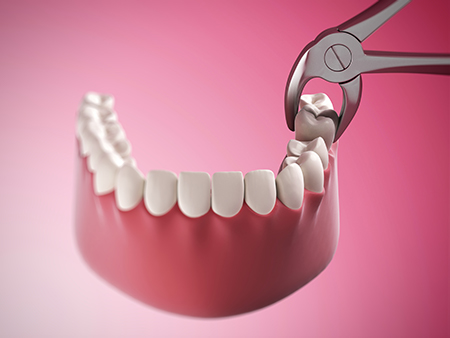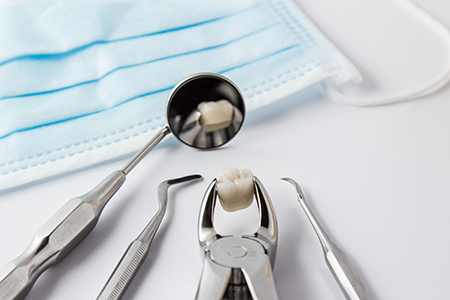
Tooth extraction is a carefully considered treatment—not a first resort. The goal of modern dentistry is always to preserve natural teeth whenever safe and practical. However, there are circumstances where removal is the healthiest, most predictable option to relieve pain, stop infection, or protect surrounding teeth and tissues.
Before recommending an extraction, our team performs a thorough evaluation of your dental and medical history, reviews symptoms, and uses imaging to understand the tooth’s condition and its relationship to nearby structures. That assessment helps determine whether a tooth can be restored or whether extraction will give you the best long-term result.
Extraction decisions balance immediate needs (pain relief, infection control) with long-term planning (bite function, adjacent teeth, and future replacement options). When a tooth is removed, we consider how the gap will affect chewing, speech, and the health of neighboring teeth so that any follow-up treatment can be coordinated and effective.
Persistent baby teeth that block permanent tooth eruption
Sometimes a primary tooth remains firmly in place past the expected age because its root did not resorb or because it fused to the jawbone. If it prevents a permanent tooth from erupting or disrupts alignment, removal can preserve long-term dental development.
Extensive decay that leaves the tooth non-restorable
When decay destroys so much of the tooth structure that rebuilding it would be unreliable, extraction may be recommended to remove the source of infection and protect surrounding teeth and tissues from further damage.
Severe fractures or structural failure
A tooth with a deep vertical fracture or a broken root may not be salvageable. In those situations, extraction prevents ongoing pain and potential spread of infection to bone or adjacent teeth.
Advanced periodontal disease affecting tooth support
When gum disease has significantly reduced the bone and soft tissue that hold a tooth, the tooth can become loose or uncomfortable. Removing a hopeless tooth can improve overall oral health and make periodontal treatment for the remaining teeth more effective.
Wisdom teeth that are impacted, decayed, or causing crowding
Third molars are common sources of trouble because they often lack space to erupt properly. If they threaten neighboring teeth, cause recurrent infections, or are non-restorable, extraction is often the most predictable solution.
Orthodontic or restorative treatment planning
In some comprehensive treatment plans—particularly when addressing severe crowding or bite concerns—the strategic removal of one or more teeth can create space and simplify the path to a stable, functional, and esthetic result.

Preparation begins with a focused clinical exam and appropriate imaging, most commonly digital radiographs, so we can see the tooth’s roots, surrounding bone, and proximity to nerves and sinus cavities. That information guides whether a straightforward removal is likely or if additional surgical steps will be needed.
Your general health and medications influence the plan. We review medical history and any prescriptions to identify infection risks, bleeding concerns, or interactions with anesthesia. When necessary, we coordinate with your physician to obtain medical clearance or modify medications to protect your safety.
For anxious patients or more complex procedures we discuss sedation and comfort options. Local anesthesia is standard, but nitrous oxide or oral sedatives can be arranged when indicated. We’ll explain what to expect and give specific pre-procedure instructions so you arrive calm and well prepared.
Simple extractions are performed when a tooth is visible and can be accessed without removing bone. After numbing the area thoroughly, the dentist gently loosens the periodontal attachments and removes the tooth with specialized forceps. The goal is efficient removal while preserving surrounding bone and soft tissue for smooth healing.
Surgical extractions are used for teeth that are broken off at the gumline, ankylosed to bone, or impacted beneath the tissues. These procedures may involve a small incision, careful removal of a bit of bone, and sectioning the tooth into pieces for safe removal. Surgical cases sometimes require sutures and a brief recovery period in the treatment chair.
Throughout both types of procedures, we prioritize infection control, precise technique, and patient comfort. If a case is unusually complex or requires specialized surgical skill, we will discuss referral to an oral and maxillofacial surgeon so you receive the best possible care.
Local anesthetic provides profound numbness for most routine extractions. For patients who need additional relaxation, we discuss sedation options in advance. If there is active infection or a higher risk of bacterial spread, antibiotics may be recommended either before or after the procedure based on clinical judgment.
We explain the reason for any medications and how to take them. Clear instructions and follow-up plans help reduce complications and support a smoother recovery for every patient.

Healing after an extraction follows a predictable course, and most people recover quickly when they follow recommended care. In the first 24–48 hours your focus should be on controlling bleeding, minimizing swelling, and protecting the blood clot that forms in the socket—this clot is essential for proper healing.
We provide clear, personalized post-operative instructions that cover activity limitations, wound care, and signs that require attention. If sutures were placed, we’ll let you know whether they are self-dissolving or if they should be removed at a follow-up appointment.
Most patients find comfort with short-term over-the-counter pain relievers or, when appropriate, a prescribed medication. Eating softer foods, avoiding smoking, and keeping the mouth clean without disturbing the extraction site all help speed recovery and reduce complications.
Maintain gauze pressure
Bite gently on the provided gauze to control bleeding. Replace the gauze as instructed, and maintain pressure until bleeding slows. A small amount of oozing can be normal for up to 24 hours; contact us if bleeding continues heavily.
Protect numb tissues
Avoid chewing, hot drinks, or touching the area while the local anesthetic is in effect to prevent accidental biting of the lip, cheek, or tongue.
Take medications as directed
If medications are prescribed, follow dosing instructions carefully. If antibiotics are part of your plan, complete the course as recommended. Use pain medication proactively when advised to maintain comfort as the anesthetic wears off.
Protect the clot
Avoid rinsing vigorously, using a straw, or any sucking actions for the first few days. These behaviors can dislodge the clot and lead to a painful condition called dry socket.
Control swelling
Apply an ice pack to the cheek in 10–15 minute intervals during the first 24 hours to reduce swelling. After the first day, warm compresses may help relax the muscles if needed.
Avoid smoking
Smoking or vaping can significantly impair healing and increase the risk of infection and dry socket. Refrain for at least one week following the extraction.
Mind your diet
Choose cool, soft foods and avoid spicy, hot, or carbonated beverages in the immediate postoperative period. Hydration is important; sip water frequently.
Gentle oral hygiene
Keep the mouth clean while avoiding direct scrubbing of the extraction site. After 24–48 hours, gentle rinses with a mild saltwater solution can help keep the area fresh.
Attend your follow-up visit
If a follow-up appointment is scheduled to check healing or remove sutures, keep that visit so we can confirm that recovery is progressing as expected.
If you experience increasing pain, excessive swelling, fever, persistent bleeding, or any other concerning symptoms, contact our office promptly so we can assess and guide you.

Removing a tooth can resolve immediate problems, but planning for the future is an important part of care. Depending on the location of the missing tooth, your oral health goals, and the condition of adjacent teeth and bone, common restorative options include dentures, fixed bridges, or dental implants.
Each replacement option has distinct benefits and clinical considerations. We discuss the pros and cons in plain language and tailor recommendations to your situation—whether your priority is preserving neighboring teeth, restoring chewing efficiency, or achieving the most natural appearance.
When appropriate, we focus on solutions that support long-term jawbone health and function. For many patients, coordinating extraction with planned restorative treatment streamlines care and improves outcomes, so we review timelines and any preparatory steps needed for a successful result.
Tooth extraction is a well-established treatment that, when used thoughtfully, relieves pain, removes infection, and helps protect overall oral health. From assessment and imaging to procedure and recovery, careful planning and clear communication make the process predictable and manageable for most patients.
Our team strives to deliver safe, comfortable care and help you understand the options that follow an extraction. For more information about what to expect or to discuss whether extraction is the right choice for you, please contact us for more information.

The most common reasons for tooth loss include advanced periodontal disease, extensive tooth decay, and facial trauma. According to statistics, gum disease is responsible for close to 70% of tooth loss in adults. Although less frequent than the preceding three reasons, it should also be noted that specific diseases, drugs, smoking, and poor nutrition contribute to the risk of tooth loss.
The Centers for Disease Control and Prevention report that in the United States, an average of 12 teeth (including the wisdom teeth) are lost by the age of 50. Also, 26% of adults between 65 and 74 years of age have lost all their teeth.
Every patient and every situation is different. However, when a tooth and the surrounding tissues are numbed with a local anesthetic, you should only expect to feel a bit of pressure, but no pain as the tooth is being loosened from the surrounding tissues and extracted. For patients who are apprehensive and for some surgical extractions, our office will discuss our options in dental sedation to provide further relaxation and reduce any sense of discomfort.
While it's normal to feel some tenderness and swelling following an extraction, the degree of these sensations can vary. It mostly depends on the complexity of the extraction and the body's response to the procedure. We'll recommend or prescribe the appropriate pain medication to help ensure your comfort and give you specific instructions for maximum effectiveness and safety.
Typically, the recovery period following a simple extraction is shorter than a surgical extraction. However, a patient's overall health, habits, the size and location of the tooth, and other variables can influence recovery and healing. To speed up the recovery and avoid any complications, patients must follow the given at-home instructions diligently. We'll carefully review what to expect following your procedure and go over your post-op instructions.
Smoking interferes with blood clot formation, which is an essential first step in the healing process. Blood clot formation not only provides a protective layer to cover the underlying exposed bone and nerve endings, but it also supports the growth of new tissue. Cigarette smoke also contains chemical toxins that can disrupt the healing process and lead to problems such as continued inflammation, infection, or dry socket.
In a very small percentage of cases, a condition known as dry socket can develop in the aftermath of a dental extraction. This painful condition can arise when the blood clot in the extraction site doesn't form properly or gets dislodged. With dry socket, you may experience throbbing pain and symptoms such as bad breath and an unpleasant taste in your mouth. As skilled providers of care, our office will provide immediate treatment to alleviate your discomfort and promote healing.
The last teeth in your mouth to develop, wisdom teeth often do not have enough room to fully erupt or may be positioned in the wrong direction. These issues can affect your dental health as well as overall wellbeing. While some individuals never develop all their wisdom teeth, and a few have sufficient space for them, there are many people with partially or fully impacted third molars. Our office will monitor the development, position, and health of your wisdom teeth and will advise you if and when extractions are indicated.
After a tooth is removed, bone-grafting material is sometimes placed in the socket to promote healing and encourage new bone development. This procedure is often performed to support the eventual and successful placement of a dental implant.
At the office of Fay Hu General Dentistry, we strive to make dental care affordable and accessible. Depending on the type or complexity of the extraction and other variables, the cost of the procedure can vary. Based on our diagnostic findings, our office will inform you of the healthiest choices in care, explain the fees, discuss insurance coverage, and explain your payment options.
Many dental plans offer some level of coverage for tooth extractions. We'll advise you if your plan covers the full cost of the procedure and if there is any out-of-pocket expense. Our business office will work with you to maximize your insurance benefits as much as possible while helping you minimize any out-of-pocket expenses.
A dental extraction is the removal of a tooth from its socket in the jawbone and is performed when preserving the tooth is not a realistic or safe option. Common reasons for extraction include severe decay that destroys tooth structure, an irreparable fracture, advanced periodontal disease that weakens support, impacted wisdom teeth, and certain orthodontic or developmental concerns. Your dentist will weigh the benefits of keeping a tooth against the risks to your overall oral health before recommending extraction.
Extractions can be planned as part of a broader treatment plan or performed urgently to address pain and infection. In children, early removal of an over-retained baby tooth may be necessary to allow the permanent tooth to erupt properly. When extractions are recommended, the dentist will explain alternatives, the type of extraction required, and the expected recovery process.
Deciding whether to save or extract a tooth begins with a thorough clinical examination and appropriate imaging, such as digital radiographs or CBCT when indicated. The dentist evaluates the amount of remaining healthy tooth structure, the condition of the root and surrounding bone, the presence of infection, and the tooth's restorability with procedures like fillings, crowns, or root canal treatment. Periodontal health, adjacent teeth, overall bite function, and the patient's general medical condition also factor into the decision.
The likelihood of predictable long-term success with restorative or periodontal therapy is compared with the risks of retaining a compromised tooth. If a tooth is structurally unsalvageable, extensively infected, or jeopardizes neighboring teeth and tissues, extraction may be the safer option. A clear treatment plan will be discussed, including timing and options for replacing the missing tooth if needed.
A simple extraction is performed on a tooth that is visible in the mouth and can be removed using elevators and forceps after the area is numb with local anesthetic. Simple extractions are generally shorter procedures and are commonly used for teeth with straightforward root anatomy and adequate access. Patients may receive additional comfort measures or sedation if they experience anxiety.
A surgical extraction is indicated when a tooth is broken at the gum line, impacted, ankylosed, or has unusual root anatomy that prevents simple forceps removal. Surgical extractions often involve a small incision in the gum, removal of a bit of bone, or sectioning the tooth into smaller pieces to allow safe removal. These procedures can be performed by a general dentist or an oral surgeon depending on complexity and patient needs.
Before an extraction, be sure to provide a complete medical history, including current medications, allergies, recent surgeries, and any chronic conditions such as diabetes, heart disease, or bleeding disorders. Inform the dentist if you are taking blood thinners, antibiotics, or immunosuppressive medications, and mention pregnancy or plans to become pregnant. This information helps the dental team plan safely, request medical clearance when necessary, and determine whether preoperative antibiotics or adjustments in medication are needed.
Also notify the office about any recent illnesses, respiratory symptoms, or issues with anesthesia in the past. Follow any preoperative instructions provided by the dental team, such as fasting for certain sedation types or arranging transportation after the appointment. Clear communication helps reduce risks and improves comfort during and after the procedure at the office of Fay Hu General Dentistry.
Pain control begins with local anesthesia to numb the tooth and surrounding tissues so the procedure itself is comfortable for most patients. For individuals with dental anxiety or more complex extractions, the dental team can discuss additional sedation options such as nitrous oxide, oral sedatives, or monitored IV sedation to improve relaxation. The choice of sedation depends on the procedure, medical history, and patient preference and will be reviewed before treatment.
After the extraction, pain is managed with a combination of prescribed or over-the-counter analgesics, rest, and home care measures like ice packs and elevation. The dentist will provide specific instructions on medication timing, activity restrictions, and signs that warrant re-evaluation. Taking medications as directed and following post-operative guidance supports a smoother, more comfortable recovery.
During the first 24 to 72 hours following an extraction you can expect some bleeding, swelling, and discomfort as the body begins the healing process and a blood clot forms in the extraction site. Swelling usually peaks around 48 hours and then gradually improves, while pain should diminish each day with proper care and medication as recommended. Rest, cold compresses during the first day, and avoiding strenuous activity help minimize swelling and bleeding.
Soft foods and adequate hydration are encouraged while the site heals, and patients should avoid actions that might disturb the clot such as spitting, using a straw, or smoking. Gentle oral hygiene should be resumed as directed, typically avoiding the extraction area for the first day or two and then rinsing gently with saltwater. A follow-up appointment will be scheduled when necessary to evaluate healing and remove sutures if they were placed.
To reduce the risk of infection or dry socket, follow your dentist's post-operative instructions carefully, take prescribed antibiotics when indicated, and use pain medication as directed. Avoid smoking and using tobacco products for at least a week after extraction, as nicotine can delay healing and increase the chance of dry socket. Do not disturb the clot by rinsing vigorously, spitting, or using a straw for the first 24 to 48 hours.
Maintain gentle oral hygiene and return for any scheduled follow-up appointments so the team can monitor healing and address concerns early. If you notice signs of infection such as worsening pain, persistent swelling, fever, or an unusual taste or odor, contact the dental office promptly for evaluation. Early intervention helps prevent more serious complications and supports timely recovery.
Wisdom teeth are commonly removed when they are impacted, decayed, causing repeated infections such as pericoronitis, or posing risk to adjacent teeth and gum tissues. Removal may also be recommended when wisdom teeth compromise orthodontic results or when radiographic evaluation shows unfavorable angulation or cyst formation. Not every wisdom tooth needs removal; if a third molar is fully erupted, healthy, and functional it may be monitored rather than extracted.
Decisions about wisdom tooth removal are individualized and consider the patient's age, symptoms, radiographic findings, and overall oral health. Younger patients often heal more quickly and may benefit from earlier removal when indicated, while older patients or those with certain medical conditions require more careful planning. Your dentist will explain the risks and benefits and recommend the best course of action for your situation.
Replacing an extracted tooth depends on its location, function, and the overall treatment plan for your mouth; dentists commonly recommend replacement to restore chewing function, prevent shifting of adjacent teeth, and maintain facial support. Common replacement options include a dental implant, a fixed bridge, or a removable partial denture, each with different clinical requirements and timelines. The choice depends on factors such as bone volume, adjacent tooth condition, medical history, and personal preferences.
Timing for replacement can be immediate in selected cases or delayed to allow for healing and, if needed, bone grafting to preserve or rebuild the extraction site. The dentist will discuss the advantages and limitations of each option and coordinate a restorative plan that aligns with your long-term oral health goals. Preserving bone and soft tissue at the time of extraction can improve outcomes for future replacement procedures when indicated.
Fay Hu General Dentistry provides extractions within a comprehensive, patient-focused dental practice that emphasizes comfort, safety, and clear communication throughout care. The team combines clinical experience with modern diagnostic tools such as digital radiography and CBCT when necessary to plan procedures precisely and anticipate potential challenges. Patients can expect personalized preoperative planning, discussion of sedation options when appropriate, and coordination of care with specialists for complex surgical cases.
After an extraction, the practice provides detailed postoperative instructions and follow-up to support optimal healing and timely decisions about tooth replacement if needed. The office prioritizes conservative treatment and will explain alternatives and restorative pathways so patients understand their options. If you have questions about extraction techniques, sedation, or replacement choices, the dental team will address them and help you make informed decisions about your oral health.

We are dedicated to providing the highest quality of dental care to our patients.
Through excellence in dentistry and quality in relationships, we strive to positively impact your oral health, aesthetics, and self-esteem. From the front desk to the treatment room, our experienced team is here to support you with expert care and genuine compassion.